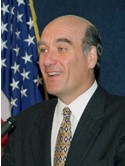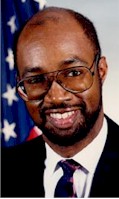
Gov Report Says Internet Use Is Soaring
(July 9, 1999) The Department of Commerce released a report on Thursday, July 8, which states that "access to computers and the Internet has soared," but that the poor and racial minorities are in danger of being left behind, so the government should facilitate Internet access.
|
Falling Through the Net: Defining the Digital Divide |
| Report Web
Site (NTIA) Complete copy in PDF (543 KB file in Commerce Dept. web site) Executive Summary (HTML) |
|
Related Documents |
| Statement by Larry Irving, 7/8/99. Letter from Wm. Daley, 7/8/99. |
The report titled "Falling Through the Net: Defining the Digital Divide," was publicly released on Thursday, July 8. It is the third in a series of reports by the Commerce Department's National Telecommunications and Information Agency (NTIA). The previous reports contained substantial similar conclusions. This latest report is based on December 1998 U.S. Department of Commerce Census Bureau data.
The report finds that "Information tools, such as the personal computer and the Internet, are increasingly critical to economic success and personal advancement. Falling Through the Net: Defining the Digital Divide finds that more Americans than ever have access to telephones, computers, and the Internet. At the same time, however, NTIA has found that there is still a significant "digital divide" separating American information "haves" and "have nots." Indeed, in many instances, the digital divide has widened in the last year."
Nevertheless, while the report concludes that Internet use is soaring, according to the report, over 67 percent of Americans do not use the Internet at home, at work, or anywhere. The report also details "which Americans are falling further behind, so that we can take concrete steps to redress this gap."
| Related Story: Economist Says Internet Use is Limited, 7/9/99. |
Also, while Clinton Administration officials yesterday were trumpeting the success of the Internet, and pushing for government programs and subsidies, the American Enterprise Institute hosted a lecture by a veteran economist who argued that the Internet has achieved only limited penetration, that it will likely remain that way, and that government efforts to provide universal access are misguided.
The administration report released yesterday focuses on price as the reason why more Americans do not use the Internet. In contrast, Bruce Owen, president of Economists Incorporated, argued that price is an important factor, but there are other reasons why the Internet cannot achieve anything close to universal use. It is difficult to use, has a complicated interface, and requires technical skill. It is also slow, time consuming, and carries insufficient content to attract universal interest. Owen concluded that Americans will not take to the Internet the way they did to the telephone and television, which are almost universally used in the U.S. today.
The administration report stated that "While competition has made computers and the Internet increasingly affordable, these technologies still remain beyond the budget of many American households. When asked why they lacked Internet access, a significant portion of households (16.8%) responded that it was too expensive. ... Policymakers, such as the Federal-State Universal Service Joint Board, State Public Service Commissions, and the Federal Communications Commission should carefully consider these facts in their attempts to evaluate the new universal service and access needs."
 |
|
| Wm. Daley |
Secretary of Commerce William Daley summarized the report in a letter: "While we know that Americans are more connected to digital tools than ever before, the report provides evidence that the "digital divide" between certain demographic groups and regions of our country continues to persist and in many cases is widening significantly. We should be alarmed by this news. Ensuring access to the fundamental tools of the digital economy is one of the most significant investments our nation can make. ... Both the government and the private sector must embrace policies and initiatives that bridge the divide."
The report is silent on the likely effect of government encryption policy on the success of the Internet. The Commerce Department, as well as the NSA, Department of Justice, and other agencies, oppose pending legislation that would liberalize encryption export restraints, ban mandatory key escrow, and guarantee Americans the right to use any encryption products. Owen, in contrast, states in his book that government encryption controls could derail the progress of the Internet. (See, Summary of Encryption Bills in the 106th Congress.)
 |
|
| Larry Irving |
Larry Irving, head of the NTIA, stated at a Washington press conference that "there is an urgent need for continued efforts to connect all Americans. Pro-competition policies will continue to make new technologies more affordable for more Americans. The data also underscore the need for Administration programs that support community access centers, such as schools, libraries, or community centers. Administration programs, such as the e-rate and NTIA's Telecommunications and Information Infrastructure Assistance Program (TIIAP), have played key roles in expanding access to computers and the Internet."
Irving continued that "The President and Vice President have also been talking about expanding community technology centers throughout the United States; with these centers, we may see the gap narrow." See, copy of Irving's statement.
| Percent
of U.S. Households with a Telephone, Computer, and Internet Use Source: Falling Through the Net: Defining the Digital Divide, July 8, 1999. |
|||
|
|
Phone |
Computer |
Internet Use |
|
1994 |
93.8 |
24.1 |
-- |
|
1997 |
93.8 |
36.6 |
18.6 |
|
1998 |
94.1 |
42.1 |
26.2 |
| Percent
of U.S. Persons Using the Internet By Location, 1988 Source: Falling Through the Net: Defining the Digital Divide, July 8, 1999. |
||||
|
|
At Home |
Outside Home |
Any Location |
No Internet Use |
|
U.S. Persons |
22.2 |
17.0 |
32.7 |
67.3 |